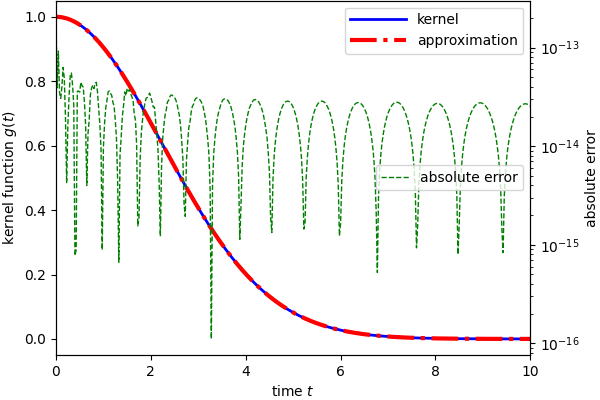
Security News
NVD Quietly Sweeps 100K+ CVEs Into a “Deferred” Black Hole
NVD now marks all pre-2018 CVEs as "Deferred," signaling it will no longer enrich older vulnerabilities, further eroding trust in its data.
eigen only provides sequential SVDThis is a C++ implementation of the VPMR algorithm to compute the approximation of arbitrary smooth kernel. A Python package is also provided.
Check the reference paper 10.1007/s10915-022-01999-1 and the original MATLAB implementation for more details.
In short, the algorithm tries to find a summation of exponentials to approximate a given kernel function. In mathematical terms, it looks for a set of $m_j$ and $s_j$ such that
$$ \max_{t\in{}I}\left|g(t)-\sum_jm_j\exp(-s_jt)\right|<\epsilon. $$
In the above, $g(t)$ is the given kernel function and $\epsilon$ is the prescribed tolerance.
The following libraries are required:
The following libraries are included:
mpreal type C++ wrapper, includedBigInt arbitrary large integer for combinatorial number, includedmpreal support, included[!WARNING] The Python module needs external libraries to be installed.
[!WARNING] Windows users need to have a working MSYS2 environment. See below for more details. For other environments, you need to figure out how to install
gmpandmpfron your own.
On RPM-based Linux distributions (using dnf), if you are:
sudo dnf install -y gcc-c++ tbb-devel mpfr-devel gmp-develsudo dnf install -y gmp mpfr tbbOn DEB-based Linux distributions (using apt), you need to sudo apt install -y g++ libtbb-dev libmpfr-dev libgmp-dev.
On macOS, you need to brew install tbb mpfr gmp.
Then install the package with pip.
pip install pyvpmr
If the corresponding wheel is not available, the package will be compiled, which takes a few minutes.
The execution of the algorithm always requires available gmp, mpfr and tbb libraries.
import numpy as np
from pyvpmr import vpmr, plot
def kernel(x):
return np.exp(-x ** 2 / 4)
if __name__ == '__main__':
m, s = vpmr(n=50, k='exp(-t^2/4)')
plot(m, s, kernel)
All available options are:
Usage: vpmr [options]
Options:
-n, --max-terms <int> number of terms (default: 10)
-c, --max-exponent <int> maximum exponent (default: 4)
-d, --precision-bits <int> number of precision bits (default: 512)
-q, --quadrature-order <int> quadrature order (default: 500)
-m, --precision-multiplier <float> precision multiplier (default: 1.5)
-e, --tolerance <float> tolerance (default: 1E-8)
-k, --kernel <string> file name of kernel function (default uses: exp(-t^2/4))
-s, --singular-values print singular values
-w, --weights print weights
-h, --help print this help message
The minimum required precision can be estimated by the parameter $n$. The algorithm involves the computation of $C(4n,k)$ and $2^{4n}$. The number of precision bits shall be at least $4n+\log_2C(4n,2n)$. In the implementation, this number will be further multiplied by the parameter $m$.
The default kernel is exp(-t^2/4). One can run the application with the following command:
./vpmr -n 30
The output is:
Using the following parameters:
terms = 30.
exponent = 4.
precision = 355.
quad. order = 500.
multiplier = 1.5000e+00.
tolerance = 1.0000e-08.
kernel = exp(-t*t/4).
[1/6] Computing weights... [60/60]
[2/6] Solving Lyapunov equation...
[3/6] Solving SVD...
[4/6] Transforming (P=+9)...
[5/6] Solving eigen decomposition...
[6/6] Done.
M =
+1.1745193571738943e+01+6.4089561283054790e-107j
-5.5143304351134397e+00+5.7204056791636839e+00j
-5.5143304351134397e+00-5.7204056791636839e+00j
-1.6161617424833762e-02+2.3459542440459513e+00j
-1.6161617424833762e-02-2.3459542440459513e+00j
+1.6338578576177487e-01+1.9308431539218418e-01j
+1.6338578576177487e-01-1.9308431539218418e-01j
-5.4905134221689715e-03+2.2104939243740062e-03j
-5.4905134221689715e-03-2.2104939243740062e-03j
S =
+1.8757961592204051e+00-0.0000000000000000e+00j
+1.8700580506914817e+00+6.2013413918954552e-01j
+1.8700580506914817e+00-6.2013413918954552e-01j
+1.8521958553280000e+00-1.2601975249082220e+00j
+1.8521958553280000e+00+1.2601975249082220e+00j
+1.8197653300065935e+00+1.9494562062795735e+00j
+1.8197653300065935e+00-1.9494562062795735e+00j
+1.7655956664692953e+00-2.7555720406099038e+00j
+1.7655956664692953e+00+2.7555720406099038e+00j
Running time: 3112 ms.

For arbitrary kernel, it is necessary to provide the kernel function in a text file.
The file should contain the kernel expressed as a function of variable t.
The exprtk is used to parse the expression and compute the value.
The provided kernel function must be valid and supported by exprtk.
Check the documentation regarding how to write a valid expression.
For example, to compute the approximation of exp(-t^2/10), one can create a file kernel.txt with the following
content:
exp(-t*t/10)
In the following, the kernel function is echoed to a file and then used as an input to the application.
echo "exp(-t*t/10)" > kernel.txt
./vpmr -n 60 -k kernel.txt -e 1e-12

The computation of weights, that involves integrals, and SVD are parallelised. A typical profiling would yield something similar to the following.

[!WARNING] The application relies on
eigenandexprtk, which depend on very heavy usage of templates. The compilation would take minutes and around 2 GB memory. You need to install librariesgmp,mpfrandtbbbefore compiling.
To avoid the hassle of installing dependencies, you can use the provided Dockerfile.
For example,
wget -q https://raw.githubusercontent.com/TLCFEM/vpmr/master/Dockerfile
docker build -t vpmr -f Dockerfile .
Or you simply pull using the following command.
docker pull tlcfem/vpmr
# or using GitHub Container Registry
docker pull ghcr.io/tlcfem/vmpr
Use the following instructions based on MSYS2, or follow the Linux instructions below with WSL.
# install necessary packages
pacman -S git mingw-w64-x86_64-cmake mingw-w64-x86_64-tbb mingw-w64-x86_64-gcc mingw-w64-x86_64-ninja mingw-w64-x86_64-gmp mingw-w64-x86_64-mpfr
# clone the repository
git clone --depth 1 https://github.com/TLCFEM/vpmr.git
# initialise submodules
cd vpmr
git submodule update --init --recursive
# apply patch to enable parallel evaluation of some loops in SVD
cd eigen && git apply --ignore-space-change --ignore-whitespace ../patch_size.patch && cd ..
# configure and compile
cmake -G Ninja -DCMAKE_BUILD_TYPE=Release .
ninja
The following is based on Fedora.
sudo dnf install gcc g++ gfortran cmake git -y
sudo dnf install tbb-devel mpfr-devel gmp-devel -y
git clone --depth 1 https://github.com/TLCFEM/vpmr.git
cd vpmr
git submodule update --init --recursive
cd eigen && git apply --ignore-space-change --ignore-whitespace ../patch_size.patch && cd ..
cmake -DCMAKE_BUILD_TYPE=Release .
make
The binary requires available gmp, mpfr and tbb libraries.
❯ ldd vpmr
linux-vdso.so.1 (0x00007ffcf3121000)
libgmp.so.10 => /lib64/libgmp.so.10 (0x00007f72087e8000)
libmpfr.so.6 => /lib64/libmpfr.so.6 (0x00007f7208736000)
libtbb.so.2 => /lib64/libtbb.so.2 (0x00007f72086f2000)
libstdc++.so.6 => /lib64/libstdc++.so.6 (0x00007f7208400000)
libm.so.6 => /lib64/libm.so.6 (0x00007f7208320000)
libgcc_s.so.1 => /lib64/libgcc_s.so.1 (0x00007f72086d0000)
libc.so.6 => /lib64/libc.so.6 (0x00007f7208143000)
/lib64/ld-linux-x86-64.so.2 (0x00007f72088a1000)
The distributed appimage is portable.
FAQs
The VPMR Algorithm
We found that pyvpmr demonstrated a healthy version release cadence and project activity because the last version was released less than a year ago. It has 1 open source maintainer collaborating on the project.
Did you know?

Socket for GitHub automatically highlights issues in each pull request and monitors the health of all your open source dependencies. Discover the contents of your packages and block harmful activity before you install or update your dependencies.

Security News
NVD now marks all pre-2018 CVEs as "Deferred," signaling it will no longer enrich older vulnerabilities, further eroding trust in its data.

Research
Security News
Lazarus-linked threat actors expand their npm malware campaign with new RAT loaders, hex obfuscation, and over 5,600 downloads across 11 packages.

Security News
Safari 18.4 adds support for Iterator Helpers and two other TC39 JavaScript features, bringing full cross-browser coverage to key parts of the ECMAScript spec.